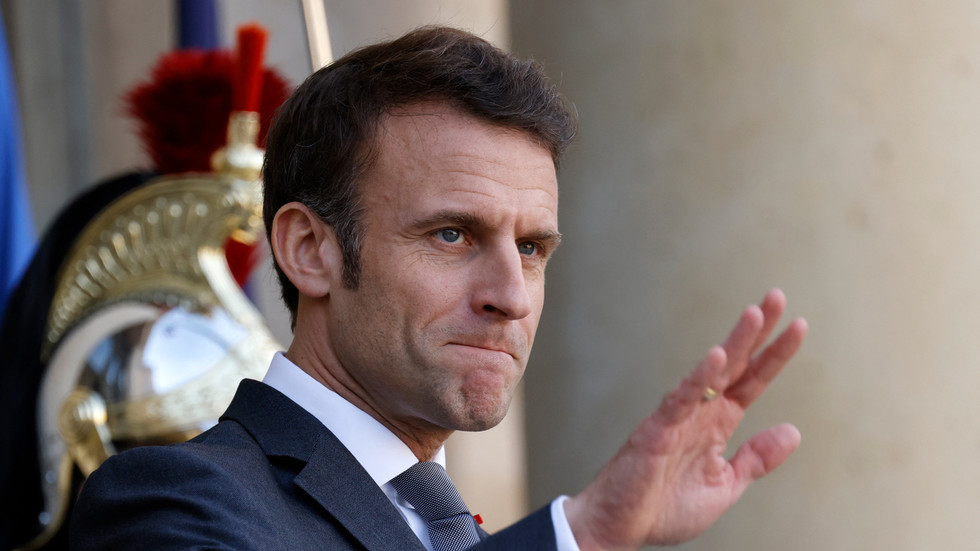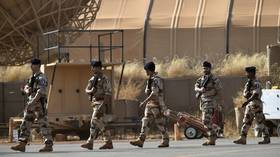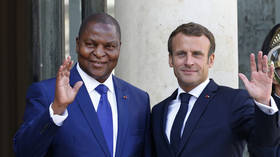
Despite efforts to put a good face on it, Paris has been unceremoniously dumped in Africa
Rachel Marsden is a columnist, political strategist, and host of independently produced talk-shows in French and English.
Rachel Marsden is a columnist, political strategist, and host of independently produced talk-shows in French and English.
rachelmarsden.com

© Ludovic MARIN / AFP
In a wide-ranging interview last weekend that aired as much of France was conveniently glued to the Paris Saint Germain vs. Olympique Marseille football match, President Emmanuel Macron was asked about his recent bad breakup. He was only too happy to spill all his feelings about the relationship, like he was talking with Oprah Winfrey rather than TV news anchors.
He said that France was ending its military cooperation with Niger and repatriating France’s ambassador to Niamey and around 1,500 troops. It’s about time, since he was already dumped a month ago and Niger has been threatening to get France’s tent off its lawn.
France’s military presence in some of its former African colonies, including Niger, was to combat terrorism, he said, adding that without France’s presence, “most of these countries would have already fallen prey to territorial caliphates and jihadists.”
Indeed, thank goodness for France, whose anti-terrorist mission was such a resounding success that the UN’s own peace operations advised the Security Council in May 2023 that “insecurity in the tri-border area of Burkina Faso, Mali and Niger continues to grow.” ‘Rampant jihadists are spreading chaos and misery in the Sahel’, a headline in The Economist read in April, while the Wilson Center reported that same month that “The Sahel Now Accounts for 43% of Global Terrorism Deaths.” All of that was going on right under France’s nose.

Read more
Rather than Macron’s suggestion that France has helped prevent these nations from becoming caliphates, there’s actually stronger evidence to suggest that’s precisely the direction they were heading under French oversight. If Macron is talking about Boko Haram, then the solution was not to invade and destabilize Libya, because Boko Haram has since benefited from looted Libyan weapons and, in 2016, Washington officials were warning of Boko Haram fighters joining up with ISIS in Libya. That’s two years after France started Operation Barkhane, its effort to combat Islamist insurgents in the Sahel. A lot of good that was doing. The French must have been imposing the same brand of modern-day French discipline that results in kids across France periodically acting out over some issue du jour and smashing up cities.
Either Macron is caught in an illusion or he thinks that the French and African people are – or that they are at least clueless enough to think that things were looking up for these countries right up until Paris was sent packing. If that was the case – if the lives of the locals were truly improving – then where are the masses in the streets protesting in opposition to France’s withdrawal?
Macron was also careful to stress that France was only there at the behest of these countries. But what if they had dared to say ‘non’, particularly in the wake of the chilling effect of the French-led NATO intervention and coup d’état in Libya that led to the death of its leader, Muammar Gaddafi, in 2011? With these Francophone African nations serving as Paris’ stockrooms for everything from critical uranium that powers its nuclear plants to black gold that fuels French industry, is it any wonder that the leaders of these countries, until now, just happen to be excessively accommodating to these French interests – lest they find themselves ‘Gaddafi’d’.
But already, with the changes in management of these countries, the French press and industry representatives have been actively wondering about the fate of French companies in the Sahel. Paris has long maintained enough control to at least keep the resources flowing. But if France ever had any concern for the locals beyond that, it would have shown it by now.
But Macron didn’t stop there with the spin. “We are not responsible for the political life of these countries,” he said. In that case, why is France constantly trying to dictate to African nations who they should or shouldn’t be partners with, most recently pressuring them to ditch Russia and China?
And why did Macron push for African countries, uninterested in playing the West’s anti-Russian sanctions game, to take a side in the Ukraine conflict during a visit to Cameroon over the summer, if he believed in staying out of African political life? And if France is so hands-off with Africa’s internal affairs, why did Burkina Faso just a few days ago accuse Paris of blocking military supplies to the landlocked country when it’s supposed to be fighting the same insurgencies that Paris claims it had been there to help quash?
Or why did Macron attempt to revamp his African strategy in February by rebranding French military bases as ‘academies’, and having a European team collaborate with ‘civil society’ players in Africa? Nothing says non-interference like funding NGOs inside foreign countries.

Read more
“We’re not there to participate in coup d’états or to interfere,” Macron said. That may be true when Paris likes the guy in charge and wants him to stay there to protect French interests. Otherwise, it’s pressure on France’s ECOWAS (Economic Community of West African States) pals to do a counter-coup, as Macron appeared to suggest during a speech to French ambassadors. “If ECOWAS abandons [Nigerien] President Bazoum, I think that all the presidents of the region are more or less aware of the fate that will be reserved for them,” Macron declared, as president of the country that has literally overthrown African leaders in the past.
Macron didn’t have anything to say about the role of Paris’ Washington allies, who trained the Nigerien coup leaders both in-country and in the US, and whose troops not only remain in Niger but have resumed intelligence and reconnaissance missions, according to the Pentagon earlier this month.
While Macron seethes at Russia for replacing France, how does he reconcile the fact that Moscow hasn’t also ‘replaced’ Washington? Is he going to accuse Moscow and Washington of colluding now, too? Maybe these African countries haven’t yet figured out exactly what they want, and with whom, although Burkina Faso, Mali, and Niger have already teamed up for their own anti-terrorism missions in a mutual defense pact. That, too, is being ‘blamed’ on Russia. In any case, sticking to the same broken relationship with Paris clearly wasn’t working.
And it looks like Macron, having been dumped, is caught somewhere between the denial and acceptance stages of grief.
The statements, views and opinions expressed in this column are solely those of the author and do not necessarily represent those of RT.




